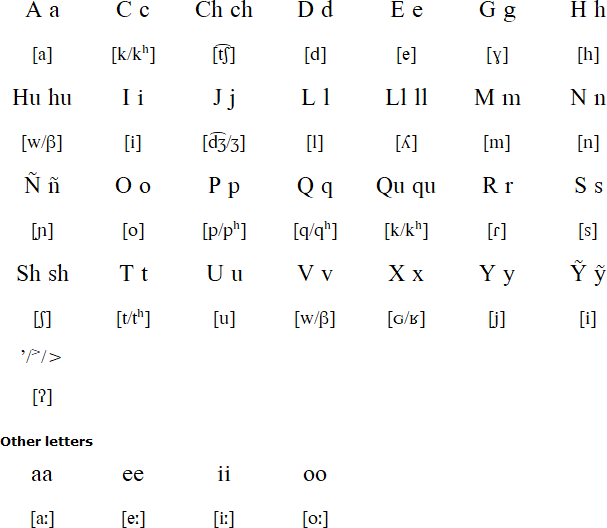Mocoví is a Southern Guaicuruan language spoken mainly in eastern Chaco Province, central and northern Santa Fe Province, and southern Formosa Province in the northeast of Argentina. There are between 4,000 and 7,000 speakers of Mocoví out of a population of about 12,000 Mocoví people. It is one of the official languages of Chaco Province, along with Spanish, Toba Qom and Wichí, and is spoken by people of all ages. In Santa Fe Province, Mocoví is spoken mainly by older people, while young people are more likely to speak Spanish.
Mocoví is called moqoit or moqoit la’qaatqa by Mocoví people. It was first documented by Lafone Quevedo, who published a grammar of the language in 1892. A way to write it with the Latin alphabet was developed by missionaries in the 1950s, based on a spelling system they developed for Toba Qom. The Bible has been translated into Mocoví.
As part of efforts to revitalise the langauge, there are classes for Mocoví adults to learn to read and write their language. The language is also taught in secondary schools, and used as a medium of instruction in primary schools, particularly in Charata and Villa Ángela in Chaco, and Melincué and Recreo in Santa Fe.

Download an alphabet chart for Mocoví (Excel)
Source: https://www.bible.com/bible/332/LUK.11.MCV91
Source: https://www.bible.com/bible/1/LUK.11.KJV
Information about Mocoví | Tower of Babel
Information about Mocoví
https://en.wikipedia.org/wiki/Mocoví_language
https://es.wikipedia.org/wiki/Idioma_mocoví
http://www.mpi.nl/DOBES/projects/chaco/mocovi
http://www.native-languages.org/mocovi.htm
https://idiomas.becasyempleos.com.ar/idioma-mocovi/
https://www.repositorio.unicamp.br/acervo/detalhe/131859
https://pueblosoriginarios.com/lenguas/mocovi/mocovi.html
Kadiwéu, Mocoví, Pilagá, Toba Qom
Languages written with the Latin alphabet
Page created: 27.05.24. Last modified: 27.05.24
[top]
You can support this site by Buying Me A Coffee, and if you like what you see on this page, you can use the buttons below to share it with people you know.

If you like this site and find it useful, you can support it by making a donation via PayPal or Patreon, or by contributing in other ways. Omniglot is how I make my living.
Note: all links on this site to Amazon.com, Amazon.co.uk
and Amazon.fr
are affiliate links. This means I earn a commission if you click on any of them and buy something. So by clicking on these links you can help to support this site.
[top]